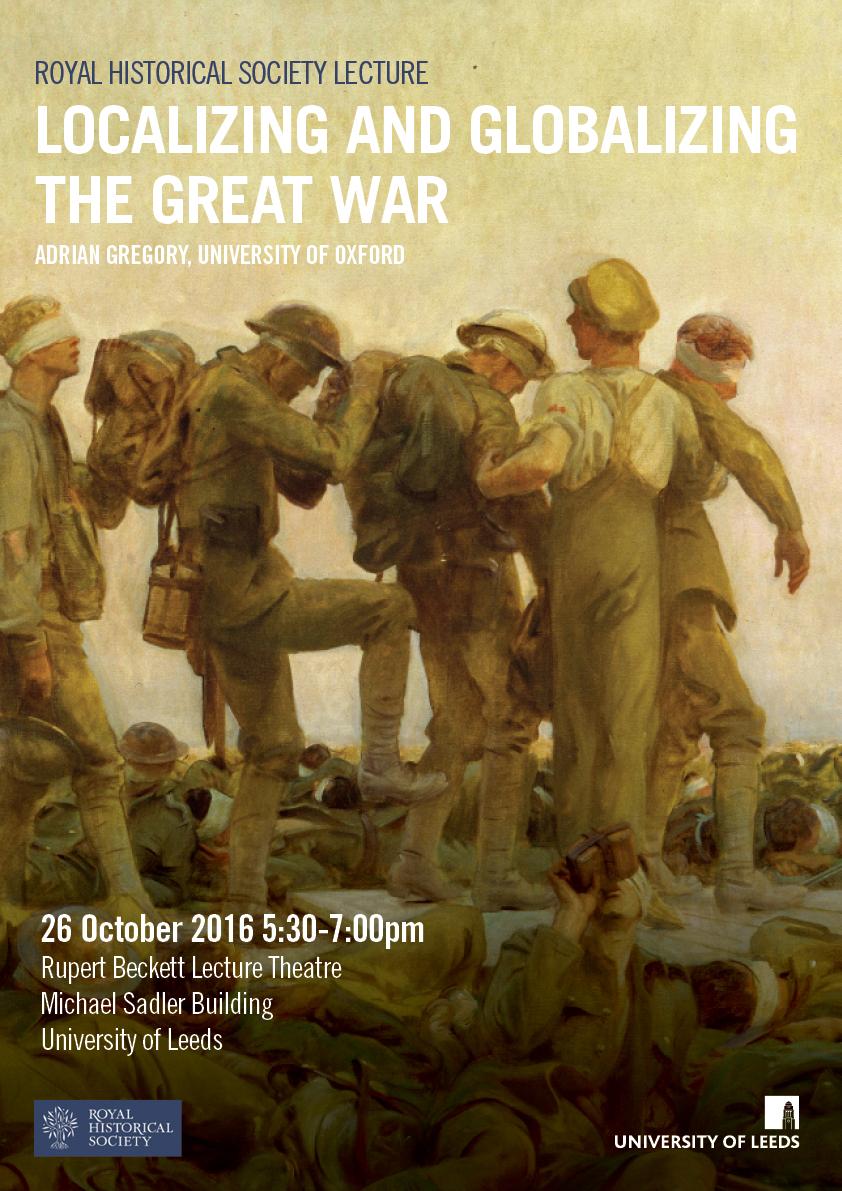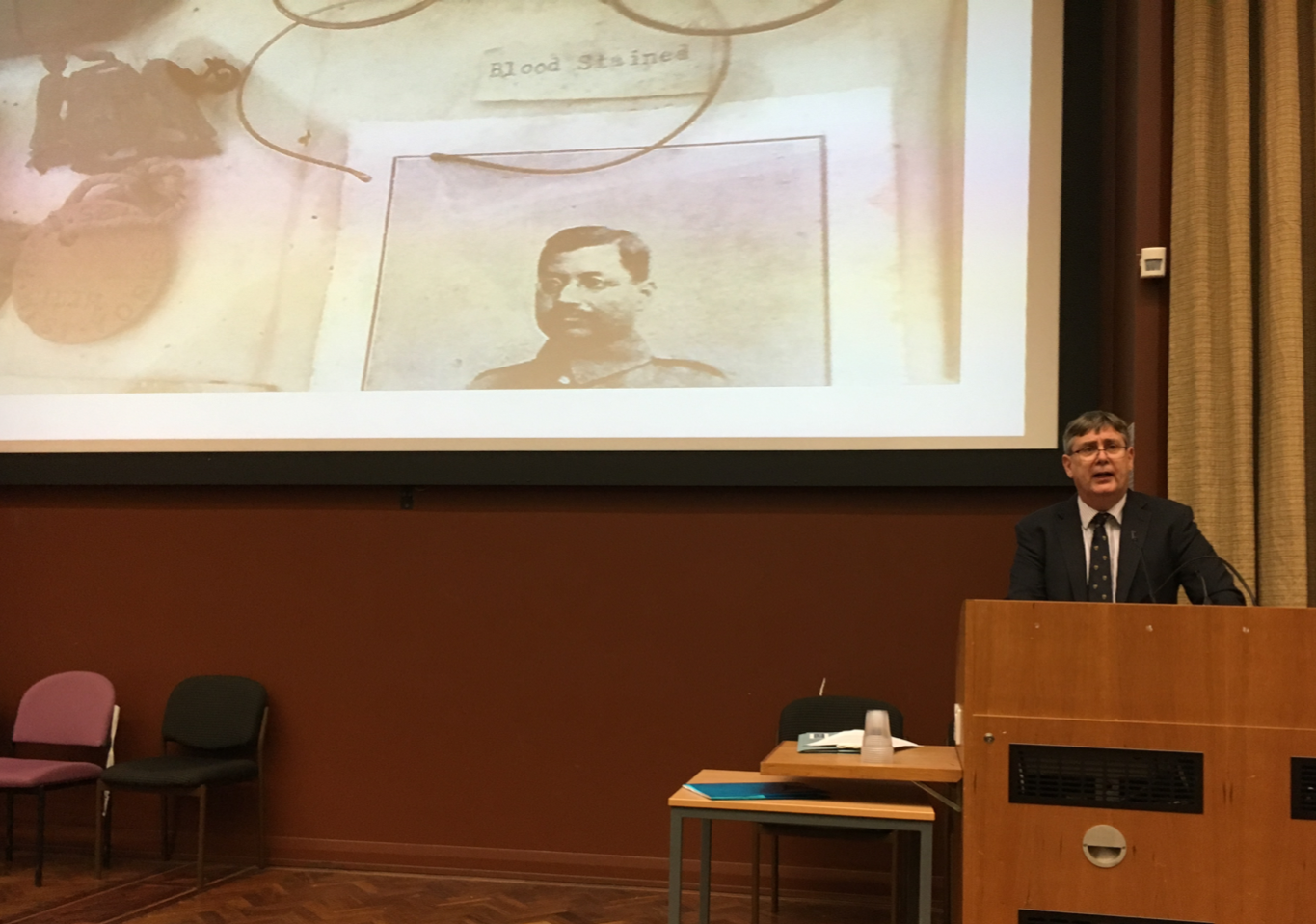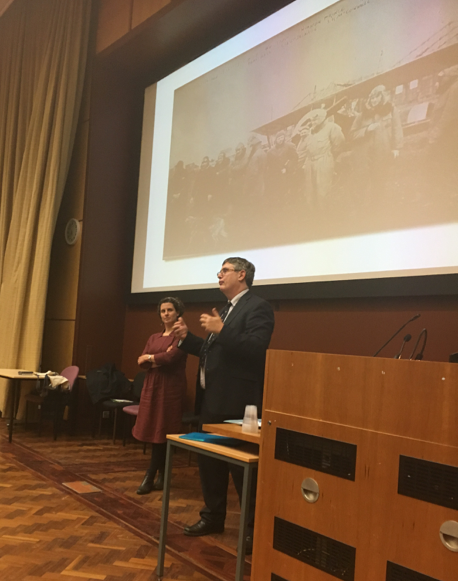Oxford Centre for Life Writing
Tuesday 8 November 2016, 5.30pm
LWA, Wolfson College
Professor Gary Sheffield will be talking about his new biography, The Chief: Douglas Haig and the British Army.
Poster: gary-sheffield-haig-poster
Free to all

Oxford Centre for Life Writing
Tuesday 8 November 2016, 5.30pm
LWA, Wolfson College
Professor Gary Sheffield will be talking about his new biography, The Chief: Douglas Haig and the British Army.
Poster: gary-sheffield-haig-poster
Free to all
On Wednesday 26 October 2016, 17:30 – 19:00, Dr Adrian Gregory gave a lecture to the Royal Historical Society, in the Rupert Beckett Lecture Theatre, Michael Sadler Building, University of Leeds.
Globalizing and Localizing the Great War: A tale of four cities
Rejecting the traditional focus on national histories, this lecture tells the story of the First World War in terms of interconnected global histories, explored through a series of towns and cities. Oxford in the UK, Halifax in Nova Scotia, Jerusalem in Palestine and Verdun in Eastern France illustrate how the world and the war interacted in flows of materials, people, ideas and images.



Do you have a family story or local history about the First World War? Bring your WW1 stories, photos, documents, letters, postcards, clothes, medals, and other objects to the Oxford at War 1914-1918 Roadshow on 12th November 11-4pm at IT Services, 13 Banbury Rd, Oxford OX2 6NN.
For more information see http://www.oxfordatwar.uk/
What to expect on the day?
You’ve seen Antiques Roadshow – well, this is the same without the valuation. Our experts will talk to you about your stories and what you have brought in. They’ll record the details, and then our digitisers will photograph your items so we can upload them to the website www.oxfordatwar.uk. Please just turn up on the day, there may be queues but also exhibitions and films to divert you. If you would like to make an appointment (optional) please ring: 01865 283686 or email ww1collections@it.ox.ac.uk
What if you can’t join us?
Do tell your friends! And you can upload your stories and photos to the website http://www.oxfordatwar.uk
Why is the University of Oxford doing this?
We want to preserve the memory of the First World War and those who lived then. By recording stories and material in digital form, they can be made available online to students, researchers, school children and anyone interested in the history of the War and the stories about the people who lived then. See more in this short video, where Dr Stuart Lee talks about why we are doing this https://youtu.be/wsUnCAPwv90
Download poster: oaw-roadshow-poster
The Institute of Historical Research and Senate House Library are hosting a fourth annual History libraries and research open day at Senate House in London on 15 November 2016. A ‘one-stop shop’ for undergraduate, postgraduate, early career and private researchers, the event brings together more than 30 libraries, archives and research organisations at an open fair. Join us to meet librarians and archivists from across London (and beyond) to find out what they have to offer you and your research. There will also be panel sessions on research methods, public history, and digital research.
Further information here.
The event is free but attendees are asked to register here.
INTERNATIONAL CONFERENCE
A Century of Funerary Sites of the Great War : from History to the Valorisation of Heritage
Université Paris Ouest Nanterre La Défense (Bâtiment B. Salle des conférences)
21 & 22 octobre 2016
Franco-Belgian Proposal for inscription on the UNESCO World Heritage List of the Funerary sites of the Great War (Western Front).
Under the high patronage of Jean-Marc Todeschini, State Secretary to the French Defense Minister, in charge of Veterans and the Memory
Directed by Annette Becker (Université Paris Ouest Nanterre La Défense) and Stéphane Tison (Université du Maine, Le Mans-Laval)
Full programme here.
The National Archives
Friday 21 October 2016, 13:30 – 17:00
Psychological trauma affected many of the men who served on the Front line, both during and after service. Yet, it was not just men who suffered – what of those nurses who treated the injured? What of the horrifying experiences they underwent?
These themes will be explored during an afternoon of talks, which will also analyse the legacy of mental health wellbeing in the armed forces to the present day.
There will also be an opportunity to learn about the documents we hold here at The National Archives which relate to mental health and the First World War, including a display of original archival material.
This exciting event will bring together the eminent speakers Edgar Jones, Matthew Green, and Denise Poynter to reflect on this important topic and its contemporary relevance.
We would love to welcome you to The National Archives for this event, so if you wish to pick up your free ticket then go to the Eventbrite page here.
Dr Rob Johnson is giving a special lecture on “The Great War and the Middle East” on 24 November from 17.00-18.30 in the Harold Lee Room, Pembroke College. It will be followed by drinks.
This is a joint event with Pembroke History Society.
Registration:
Register on: ccw.ox.ac.uk/events
Or via Eventbrite: https://www.eventbrite.co.uk/e/the-great-war-and-the-middle-east-tickets-28330554451
Many of the most commonly accepted assertions about the First World War in the Middle East are more often stated than they are truly tested. Drawing on detailed research into the strategic and operational course of the war in the Middle East, Rob argues that, far from being a sideshow to the war in Europe, the Middle Eastern conflict was in fact the centre of gravity in a war for imperial domination and prestige. Moreover, contrary to another persistent myth of the First World War in the Middle East, local leaders and their forces were not simply the puppets of the Great Powers in any straightforward sense. The way in which these local forces embraced, resisted, succumbed to, disrupted, or on occasion overturned the plans of the imperialist powers for their own interests in fact played an important role in shaping the immediate aftermath of the conflict – and in laying the foundations for the troubled Middle East that we know today.
Download poster: rjmiddleeast